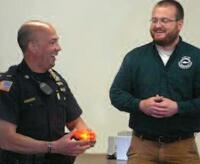Cape Cod Cooperative Extension
April 21, 2010
Cape Cod Cooperative Extension Recognized for Environmental Leadership
Education and action put Barnstable County group on the state’s environmental honor roll
Barnstable, Mass. – In a powerful combination of education and action, Cape Cod Cooperative Extension has engaged Barnstable County fire, policy and emergency response departments—and the U.S. Coast Guard—in a local water protection program.
Today, this community organization whose work affects virtually every resident on Cape Cod is one of only 17 Massachusetts organizations being recognized by the Toxics Use Reduction Act (TURA) Program and state dignitaries as a “TURA 20th Anniversary Leader.” The awards and facility tours are intended to showcase environmental accomplishments –use of safer materials, waste reductions and energy savings – since the Toxics Use Reduction Act was enacted in 1989.
“We selected Cape Cod Cooperative Extension for its leadership in protecting water resources from being contaminated from perchlorate, a chemical that can leach out of emergency flares,” said Joy Onasch, community program manager with the Toxics Use Reduction Institute (TURI) at UMass Lowell. “The Extension’s work is a great community-based example of how getting the word out on safer alternatives can be effective in protecting human health and the environment.”
The initiative, funded with a $15,000 grant from the TURI Community Program, is designed to stop perchlorate contamination in public and private drinking wells. A significant source of perchlorate is marine and road flares, which burn the chemical to mark the scene of an accident or as a call for assistance when boating. High levels of perchlorate affect the thyroid gland, which can alter the function of many other organs. Massachusetts was the first state to create a perchlorate threshold allowed in drinking water.
The Cape Cod Cooperative Extension held educational sessions with municipal departments
The Cape Cod Cooperative Extension held educational sessions with municipal departments and distributed the safer LED signal flares. The team also developed a program to educate boaters on proper disposal. In a partnership with the U.S. Coast Guard, LED signal flares are being tested as a replacement for handheld perchlorate flares on boats.
“The funding from TURI was instrumental in our work, and we are gratified to be honored in this way,” said Michael S. Maguire, Cape Cod Cooperative Extension Educator. “We also see it as well-earned recognition for police departments and boaters who embraced this project as their own. They are environmental leaders by using the safer alternatives and returning existing flares for safe disposal.”
The marine and road flares collection program began on Cape Cod in January 2005
The marine and road flares collection program began on Cape Cod in January 2005. In 2009 alone, more than 3,000 flares of various types were collected for safe disposal across 18 town fire departments and transfer stations. By keeping these flares out of use and properly stored, the potential for contamination has been minimized.
About Cape Cod Cooperative Extension
Cape Cod Cooperative Extension is the education department for Barnstable County. It educates the public on topics as diverse as deer ticks to water quality and much, much more. CCCE is part of national educational system, developed to convey research-based knowledge from Land Grant Universities (in CCCE's case, UMass Amherst), to the general public. This national outreach system was mandated by the Smith-Lever Act in Congress 1914. Educational programs focus on agriculture, marine resources, horticulture, aquaculture, natural resources, water quality, recycling, household hazardous waste, nutrition, food safety, youth development and environmental education issues facing the county.
About the Toxics Use Reduction Act Program
Twenty years ago, the Massachusetts legislature passed landmark legislation—the Toxics Use Reduction Act (TURA). Today, the TURA Program is considered a model environmental policy by other states and countries. The three agencies below have provided training, grants, technical assistance and support to help companies reduce toxic chemical use and costs, improve health and safety and establish new green markets.
- Toxics Use Reduction Institute (TURI) at the University of Massachusetts Lowell. Provides education, training, and grants for Massachusetts industry and communities; sponsors research and demonstration sites on safer materials and technologies; provides policy analysis; and manages the TURA Science Advisory Board.
- Office of Technical Assistance & Technology (OTA). A non-regulatory agency within the Executive Office of Energy and Environmental Affairs that provides free, confidential, on-site technical and compliance consultations to Massachusetts businesses and institutions.
- Massachusetts Department of Environmental Protection (MassDEP). Certifies Toxics Use Reduction (TUR) Planners, receives and reviews toxics use reports submitted by companies, provides guidance, takes enforcement actions, and collects chemical use data and makes it available to the public.
